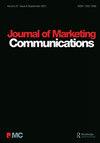b微信功能在线参与对上海游客参与行为和休闲旅游的影响
IF 4.6
Q1 Business, Management and Accounting
引用次数: 0
摘要
受新冠肺炎疫情影响,2020年,在线下旅游受限的情况下,线上互动参与度有所提高,旅游业复苏有所推迟。本研究采用一种修正的非递归单向回归模型,研究了受微信(时刻、订阅、渠道、小程序)在线功能和游客参与意向变量(主观规范、情感、感知价值)影响的营销传播对行为参与的影响。共收到有效电子问卷反馈173份,采用SPSS.26软件对数据进行处理,采用手工路径分析进行模型拟合,检验实证假设。归纳研究结果可以帮助解释管理应用的一般问题,因为它们满足了识别潜在游客和积极促进后续休闲旅游参与行为的要求。本研究的结果有助于增强微信营销与休闲旅游参与之间的因果关系,并内化在线功能对意向的影响,这通常被认为是一个中介因素。它结合了心理变量和消费者行为对营销管理的影响。修正后的理论模型代表了营销策略的变化,简化了上海旅游业复兴的大众营销。©2023 Informa UK Limited以Taylor & Francis Group的名义进行交易。本文章由计算机程序翻译,如有差异,请以英文原文为准。
Influence of online engagement of WeChat functions on tourist participation behaviour and leisure travel in Shanghai
Due to the COVID-19 pandemic, in 2020, there has been increased participation in online interactivities as offline travels are limited, and tourism recovery has been delayed. This study used a modified non-recursive unidirectional regressive model to understand the influence of marketing communication on behavioural participation influenced by online functions from WeChat (Moment, Subscription, Channel, and Mini-Program) and intention variables (Subjective Norm, Affection, and Perceived Value) for tourist participation. Overall, 173 valid e-questionnaire feedbacks were received, and the data were processed using SPSS.26 to test the empirical hypotheses using manual path analysis for model fitting. The inductive research findings can help interpret general questions for managerial applications as they fulfil the requirements of identifying potential tourists and actively promote the participation behaviours of subsequent leisure travels. The findings of this study can help enhance the causal relationship between WeChat marketing and leisure travelling participation and internalise the influence of online functionality on intention, which is generally considered an intermediary factor. It combines the impacts of psychological variables and consumer behaviour on marketing management. The modified theoretical model represents a change in marketing strategy and simplifies mass marketing for reviving tourism in Shanghai. © 2023 Informa UK Limited, trading as Taylor & Francis Group.
求助全文
通过发布文献求助,成功后即可免费获取论文全文。
去求助
来源期刊

Journal of Marketing Communications
Business, Management and Accounting-Business and International Management
CiteScore
7.70
自引率
0.00%
发文量
44
期刊介绍:
The Journal of Marketing Communications is a double-blind peer-reviewed journal devoted to publishing research papers and information concerning all aspects of marketing and corporate communication, branding both corporate and product-related, and promotion management. It is a channel for discussing issues such customer relationship management, integrated marketing communication, together with behavioural foundations of marketing communications and promotion management. The Journal will also consider papers in internal marketing and in the corporate communications domain.
 求助内容:
求助内容: 应助结果提醒方式:
应助结果提醒方式:


